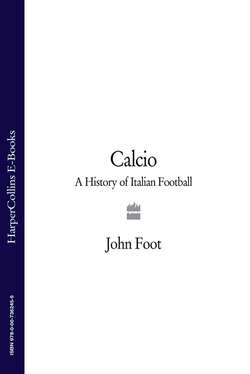Читать книгу Calcio: A History of Italian Football - John Foot - Страница 61
Great Inter (Grande Inter)
ОглавлениеIn Nanni Moretti’s hilarious coming-of-age satire, Ecce Bombo (1978), a group of students mope around Rome looking for a meaning in life. They try group therapy and politics, they experiment with alternative lifestyles. Nothing works. They stay up all night to watch the sunrise, only to find that their car is facing the wrong way. At one point in the film, some of the students study half-heartedly for a university exam. They are attempting to learn the names of the presidents of the Italian Republic since 1946. The list starts out correctly: ‘De Nicola’, but then the three students all repeat a different set of names, like a mantra: Burgnich, Facchetti, Bedin, Guarnieri, Picchi, Jair, Mazzola, Domenghini, Suarez, Corso: The Great Inter.
Inter’s teams of the 1960s were built around an unlikely alliance between a self-made oil billionaire from a small town near Varese in Lombardy – Moratti – and an Argentinian-born Spanish-Moroccan manager who had made his name with Barcelona – Herrera. Together, and not without furious arguments, these two constructed a formidable side. They also revolutionized calcio in other ways, institutionalizing rigid, almost militaristic training regimes, organizing fans into travelling armies and bringing in a style of play that combined catenaccio defence with rapid and beautiful counter-attacking. All this was achieved with the luxury of a mercurial and lazy genius in midfield – Mario Corso. Herrera was the first modern manager, a superstar whose pay matched his fame. After his departure in 1967, Inter won very little, picking up a mere three scudetti over the next 37 years: a disaster for a club of their standing. No wonder that nostalgia about that glorious period of success is so strong amongst the generation of fans who grew up with that team. Inter’s terrible run came to an end in unexpected fashion in 2006–7, when the calciopoli scandals saw the club win two championships in a year, the first of which was only thanks to the top two teams being docked points retrospectively.
